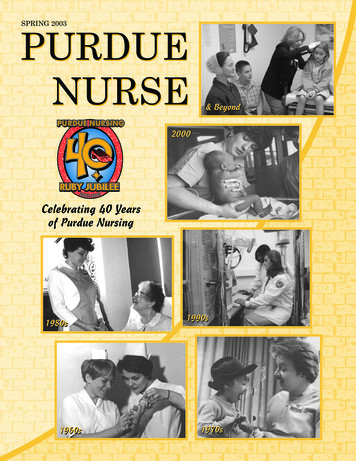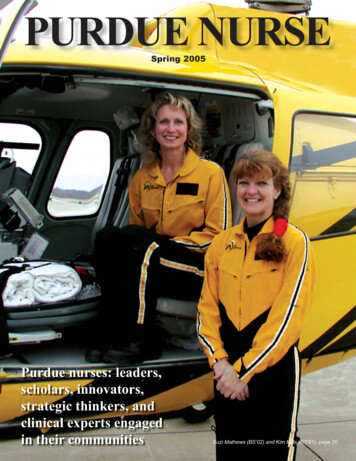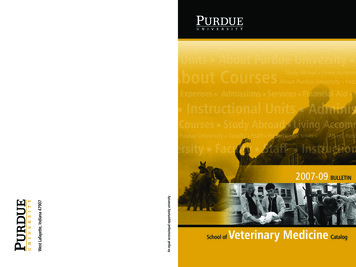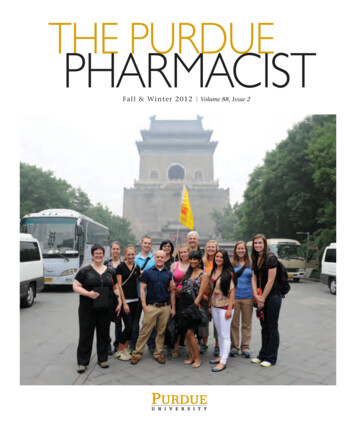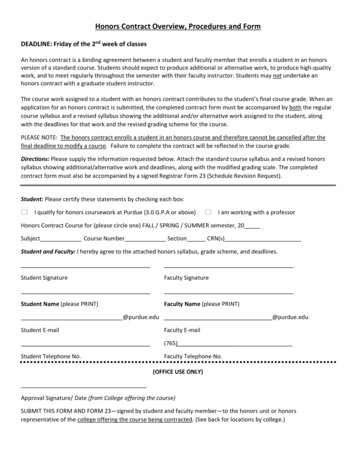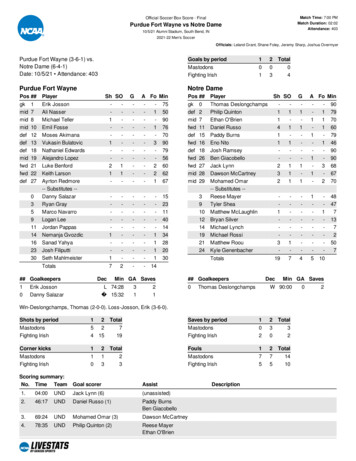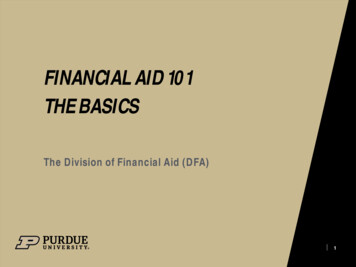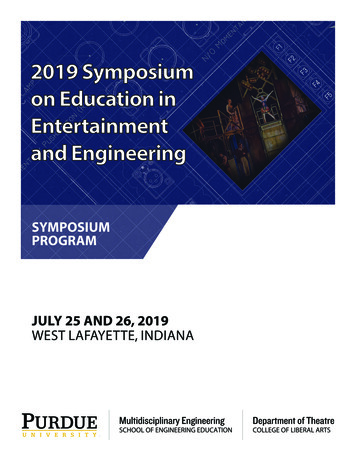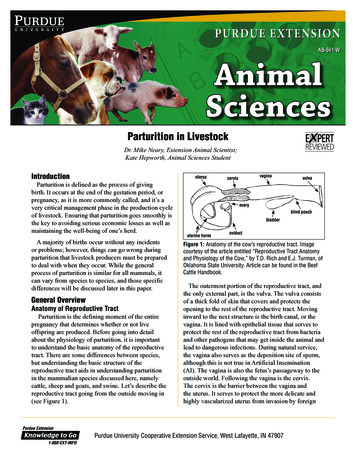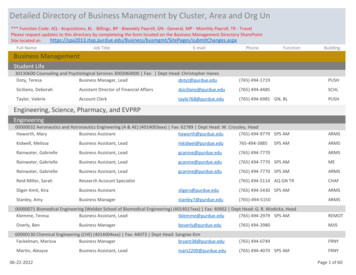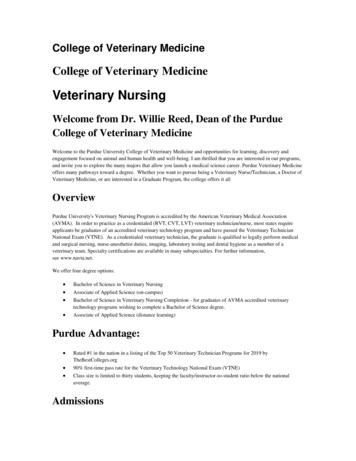
Transcription
College of Veterinary MedicineCollege of Veterinary MedicineVeterinary NursingWelcome from Dr. Willie Reed, Dean of the PurdueCollege of Veterinary MedicineWelcome to the Purdue University College of Veterinary Medicine and opportunities for learning, discovery andengagement focused on animal and human health and well-being. I am thrilled that you are interested in our programs,and invite you to explore the many majors that allow you launch a medical science career. Purdue Veterinary Medicineoffers many pathways toward a degree. Whether you want to pursue being a Veterinary Nurse/Technician, a Doctor ofVeterinary Medicine, or are interested in a Graduate Program, the college offers it allOverviewPurdue University's Veterinary Nursing Program is accredited by the American Veterinary Medical Association(AVMA). In order to practice as a credentialed (RVT, CVT, LVT) veterinary technician/nurse, most states requireapplicants be graduates of an accredited veterinary technology program and have passed the Veterinary TechnicianNational Exam (VTNE). As a credentialed veterinary technician, the graduate is qualified to legally perform medicaland surgical nursing, nurse-anesthetist duties, imaging, laboratory testing and dental hygiene as a member of aveterinary team. Specialty certifications are available in many subspecialties. For further information,see www.navta.net.We offer four degree options: Bachelor of Science in Veterinary Nursing Associate of Applied Science (distance learning)Associate of Applied Science (on-campus)Bachelor of Science in Veterinary Nursing Completion - for graduates of AVMA accredited veterinarytechnology programs wishing to complete a Bachelor of Science degree.Purdue Advantage: Rated #1 in the nation in a listing of the Top 50 Veterinary Technician Programs for 2019 byTheBestColleges.org 90% first-time pass rate for the Veterinary Technology National Exam (VTNE)Class size is limited to thirty students, keeping the faculty/instructor-to-student ratio below the nationalaverage.Admissions
On-Campus Admission Requirements Bachelor of Science in Veterinary NursingAssociate of Applied Science (on-campus)Bachelor of Science in Veterinary Nursing Completion, for graduates from AVMA accredited veterinarytechnology programs wishing to complete a Bachelor degree.Distance Learning Admission Requirements Associate of Applied Science (distance learning)For questions on admissions requirements and procedures, contact the Purdue University Office of Admissions.Office of AdmissionsSchleman Hall of Student Services475 Stadium Mall DriveWest Lafayette, IN 47907-0544admissions@purdue.edu765-494-1776Student ServicesThe role of the College of Veterinary Medicine Student Services Center is to provide for recruitment, admissions,student life and career transition in the College of Veterinary Medicine. Whether you are a prospective student, acurrent student, or even an alum of our College, please feel free to contact our office and our staff will point you in theright direction. Schedule a Visit to the College of Veterinary MedicineCollege of Veterinary Medicine625 Harrison StreetWest Lafayette, IN 47907Phone: (765) 494-7607pvmstudentservices@purdue.eduVeterinary Nursing Program OfficeThe role of the Veterinary Nursing Program Office is to provide support and assistance to prospective and currentstudents. Whether you are a prospective student, a current student, or even an alum of our College, please feel free tocontact our office and our staff will point you in the right direction.Academic advising is a partnership between the student and advisor. Advisors empower students, assist with goalachievement, and support students with academic and personal concerns. Advisors assist students with thedevelopment and implementation of plans for academic success, and personal and career development. Students areproactive and seek assistance. They are informed and review their degree requirements and monitor their academicprogress and reach out to their advisors with any questions and concerns.
Meet our TeamCollege of Veterinary Medicine AdministrationAbout the Veterinary Technology ProgramVeterinary Technology EducationThe Purdue Veterinary Technology program is fully accredited by the American Veterinary Medical Association(AVMA) and is a science based veterinary nursing program offering a Bachelors and Associate of Applied Sciencedegrees.As an integral part of the veterinary team, veterinary technicians and technologists perform a wide range of veterinaryskills: Radiology Humane Societies and animal control facilitiesNursing care, including pre and post-surgical careAnesthesiaClient educationWhile a majority of veterinary technicians and technologists enter the profession in private veterinary practice, thereare many other employment opportunities with a Veterinary Technology degree:IndustryBiomedical ResearchVeterinary Supply SalesTechnicians credentialing (certification, licensure, or registration) is required in the majority of states in the UnitedStates. Candidates for credentialing must pass a national and/or state examination. Most states require that onlygraduates of Veterinary Technology programs accredited by the American Veterinary Medical Association (AVMA)are eligible to take the national credentialing exam and to become credentialed Veterinary Technicians.DoctoralVeterinary Medicine, DVMAbout the ProgramThe veterinary profession is a diverse, exciting and rewarding occupation that allows for pursuits in a variety of fieldsincluding community health, food resource management, wildlife preservation, marine biology and many others. Itallows you to take your passions and apply them to advance animal, and even human, health. If you are ready toexplore what it takes to become a veterinarian, check out our DVM Program for requirements and additionalinformation including an early admission program for high achieving high school seniors. Whether you are in highschool, middle school or grade school, it's never too early see what drives you. For high school and middle schoolstudents interested in a week long summer camp to experience the world of veterinary medicine, we host Boiler VetCamp every summer.
Degree Requirements165.5 Credits RequiredProgram RequirementsFall 1st Year BMS 80100 - Gross Anatomy Of The Dog And CatBMS 80700 - Veterinary Cell And Tissue Biology Design IBMS 81000 - Foundations In Basic Medical SciencesBMS 81100 - Physiology Of Domestic Animals IVCS 80110 - Veterinary Skills And Competencies IVCS 80130 - Introduction To Population Medicine And Veterinary EthicsVCS 80400 - Behavior In Domestic AnimalsVM 82000 - Applications And Integrations IVM 82500 - Current Issues In Veterinary MedicinePVM Diversity and Inclusion Certificate (Students are required to complete this on-line certificate program toenhance their intercultural competency.)18 CreditsSpring 1st Year BMS 80200 - Comparative AnatomyBMS 80800 - Veterinary Cell And Tissue Biology Design IIBMS 81200 - Physiology Of Domestic Animals IIBMS 81500 - Veterinary NeuroscienceCPB 85300 - Principles Of Veterinary ImmunologyVCS 80120 - Veterinary Skills And Competencies IIVCS 80140 - Fundamental Principles Of Comparative NutritionVM 82500 - Current Issues In Veterinary MedicineVM 83000 - Applications And Integrations II20 CreditsSpring Electives 1st Year(Students are not required to take any electives) BMS 81900 - Endocrine And Neural Basis Of Seasonal Activities Of Birds And Mammals In TheWild VM 80900 - International Veterinary MedicineVM 86000 - Early Origins Of Veterinary Medicine Seminar
VM 86500 - History Of Veterinary Medicine From Marshals, Horse Doctors, Cow Leeches, TheFirst Schools Of VM VM 86700 - Veterinary Medicine Comes Of AgeFall 2nd Year BMS 81401 - Pharmacology Principles And ApplicationsCPB 85100 - General PathologyCPB 85204 - Veterinary ParasitologyCPB 85500 - Veterinary Hematology And CytologyCPB 85602 - Veterinary Bacteriology And MycologyVCS 80210 - Veterinary Skills And Competencies IIIVM 82500 - Current Issues In Veterinary MedicineVM 84000 - Applications And Integrations III20 CreditsFall Electives 2nd Year(Students are not required to take any electives) VCS 89300 - Shelter Animal MedicineVM 86600 - Pathogenic Bacteria, Viruses, Mayhew, Darwin, And MendelVM 87000 - History Of Veterinary Medicine From The Ancient Greeks Through The RenaissanceSeminarSpring 2nd Year BMS 81600 - Applied Pharmacology IICPB 81900 - Veterinary ToxicologyCPB 85401 - Epidemiology And Evidence-Based Veterinary MedicineCPB 85700 - Veterinary Systemic PathobiologyCPB 86000 - Veterinary VirologyCPB 86100 - Veterinary Clinical ChemistryCPB 86900 - Veterinary Public Health And ZoonosesVCS 80220 - Veterinary Skills And Competencies IVVM 82500 - Current Issues In Veterinary Medicine19.5 CreditsSpring Electives 2nd Year(Students are not required to take any electives) BMS 81900 - Endocrine And Neural Basis Of Seasonal Activities Of Birds And Mammals In TheWild VCS 89200 - Veterinary Forensic Medicine
VM 80900 - International Veterinary Medicine VM 86700 - Veterinary Medicine Comes Of AgeVM 86000 - Early Origins Of Veterinary Medicine SeminarVM 86500 - History Of Veterinary Medicine From Marshals, Horse Doctors, Cow Leeches, TheFirst Schools Of VMYear 3 Core/elective approachCourses organized along species linesCore courses 1) required for all tracks 2) cover all major domestic species and all major disciplinesElectives 1) chosen based on track and student's career goals 2) choices made in consultation with facultyadvisorFall 3rd Year VCS 80310 - Veterinary Skills And Competencies VVCS 80610 - Small Animal Medicine IVCS 80630 - Small Animal SurgeryVCS 80801 - Equine MedicineVCS 80910 - Food Animal ScienceVCS 81101 - Small Animal Surgery Lab IVCS 81201 - Principles Of Veterinary AnesthesiologyVCS 81410 - Comparative TheriogenologyVM 82500 - Current Issues In Veterinary Medicine20 CreditsFall Electives 3rd Year(Students are not required to take any electives) BMS 80300 - Applied Anatomy Of The Dog And CatBMS 80400 - Applied Anatomy Of The HorseVCS 83100 - Equine Theriogenology LaboratoryVCS 89300 - Shelter Animal MedicineVM 86600 - Pathogenic Bacteria, Viruses, Mayhew, Darwin, And MendelVM 87000 - History Of Veterinary Medicine From The Ancient Greeks Through The RenaissanceSeminarSpring 3rd YearCore Courses: VCS 80320 - Veterinary Skills And Competencies VIVCS 80620 - Small Animal Medicine IIVCS 80920 - Large Animal SurgeryVCS 81210 - Small Animal Primary Care And Wellness
VCS 81500 - OphthalmologyVCS 81700 - Achieving Success In Private PracticeVCS 81802 - Small Animal Surgery Laboratory IIVCS 82701 - Diagnostic ImagingVM 82500 - Current Issues In Veterinary MedicineElectives:Electives - Credit Hours: 5.0020 CreditsSpring Electives 3rd Year(Students are required to enroll in a minimun of 5 credits of electives) BMS 80500 - Applied Anatomy Of Production Animals VM 86700 - Veterinary Medicine Comes Of AgeCPB 84000 - Use And Care Of Laboratory AnimalsCPB 87000 - Diagnostic Veterinary CytologyVCS 80500 - Small Animal Behavioral TherapyVCS 80616 - Small Animal Clinical NutritionVCS 82200 - Large Animal Surgery IVCS 82300 - Large Animal Surgery IIVCS 82501 - Ruminant TheriogenologyVCS 83200 - Equine LamenessVCS 83700 - Clinical Nutrition For Ruminants And SwineVCS 83800 - Swine Production MedicineVCS 83903 - Cattle Production MedicineVCS 84300 - Successful Practice SkillsVCS 84601 - Small Animal Medicine IIIVCS 84701 - Small Animal Medicine IVVCS 84800 - Advanced Small Animal SurgeryVCS 85100 - Medicine And Surgery Of Nontraditional PetsVCS 85300 - Small Animal Emergency And Critical CareVCS 89200 - Veterinary Forensic MedicineVM 86000 - Early Origins Of Veterinary Medicine SeminarVM 86500 - History Of Veterinary Medicine From Marshals, Horse Doctors, Cow Leeches, TheFirst Schools Of VMYear 4 See Academic Advisor: The fourth year consists entirely of clinical rotations. There are no didactic courses inthe fourth year. The fourth year begins the Monday following semester 6 final examinations and continuesfor a full 12 months. The fourth year curriculum is determined by the student's track. Track selection occurs during semester 5while selecting electives for semester 6. The track chosen determines the required and elective blocks for thefourth year.
There are seven tracks:1. Veterinary Medicine Equine Track2. Veterinary Medicine Food Animal Track3. Veterinary Medicine Small Animal Track4. Veterinary Medicine Companion Animal Track (horses and small animals)5. Veterinary Medicine Large Animal Track (horses and food animals)6. Veterinary Medicine Mixed Animal Track (all species)7. Veterinary Medicine Non-Practice Track (for individuals targeting a career in industry or research)Notes First year year students will have a co-curricular requirement to complete all of the online modules in thePVM Diversity and Inclusion Certificate Program. For the D.V.M. program, a passing grade is defined as a grade of C- or higher with weighted grades, Pass orSatisfactory. Achieved a minimum program index of 2.00.DisclaimerThe student is ultimately responsible for knowing and completing all degree requirements.The myPurduePlan powered by DegreeWorks is the knowledge source for specific requirements and completion.AssociateVeterinary Nurse Distance Learning, AASAbout the ProgramAssociate in Applied Science Distance Learning ProgramThe Veterinary Nurse program is a science-based veterinary nursing program offering an Associates in AppliedScience (AAS) degree. The Veterinary Nurse Distance Learning program at Purdue University is designed to allow astudent to gain the knowledge, information, and skills necessary to practice as a veterinary technician. It is an AVMAaccredited degree. At its completion, the student is eligible to take the Veterinary Technician National Exam (VTNE).Typically, most students who complete the Distance Learning AAS are already employed with a veterinarian, and planto continue working in the field. Students are willing to make a long-term commitment to develop the skills and acquirethe extensive knowledge required to be a Veterinary Technician.
The curriculum contains 27 didactic courses and 18 clinical mentorships. It is a part-time program and cannot be takenfull-time. Financial aid eligibility is limited. Students are responsible for finding their own mentorship sites with aveterinary health care facility.Most courses are offered every semester, i.e. fall, spring and summer. Courses follow the Purdue class calendar.Students may begin the program at the start of any semester.More information is on the Purdue College of Veterinary Medicine Veterinary Nursing website.Degree Requirements70 Credits RequiredDepartmental/Program Major Courses (65 credits)Required Major Courses (46.5 credits) BMS 11500 - Anatomy For Veterinary Technicians I - DLBMS 11600 - Anatomy For Veterinary Technicians II - DLBMS 13500 - Physiology For VeterinaryTechnicians I - DLBMS 13600 - Physiology For Veterinary Technicians II - DLBMS 23500 - Pharmacology VT-DLBMS 23600 - Pharmacology II VT-DLCPB 15001 - Clinical Pathology For Veterinary Technicians I - DLCPB 22501 - Parasitology For Veterinary Technicians I - DLCPB 22700 - Microbiology For Veterinary Technicians-DLCPB 24000 - Public And Occupational Health For Vet Techs I -DLCPB 25100 - Clinical Pathology For Veterinary Technicians II - DLVCS 14001 - Small Animal Nursing For Veterinary Technician I - DLVCS 14700 - Principles Of Techniques And Sterilization-DLVCS 14801 - Large Animal Nursing And Health Management For Veterinary Technicians I - DLVCS 20100 - Pharmacy Procedures For VT -DLVCS 23001 - Small Animal Nursing For Veterinary Technician II - DLVCS 23300 - Introduction To Ophtho Derm And Oncology-DLVCS 23701 - Large Animal Nursing And Health Management For Veterinary Technicians II - DLVCS 23900 - Dentistry For Veterinary Technicians - DLVCS 24000 - Nutrition For Veterinary Technicians - DLVCS 24200 - Diagnostic Imaging For Veterinary Technicians - DLVCS 24400 - Anesthesia For Veterinary Technicians - DLVM 10500 - Introduction to Veterinary Technology-DLVM 22800 - Integrations For Veterinary Technicians - DLVM 22900 - Laboratory Animal Health For Veterinary Technicians - DLVM 24500 - Management Topics for Vet Techs I -DLVM 24800 - Understanding Animal Disease-DLRequired Major Clinical Mentorships (18.5 credits)
VM 20500 - Small Animal Nursing Clinical Mentorship I-DLVM 20600 - Small Animal Nursing Clinical Mentorship II-DLVM 20700 - Small Animal Nursing Clinical Mentorship III-DLVM 20800 - Large Animal Medical Nursing Clinical Mentorship -DLVM 20900 - Equine Medical Nursing Clinical Mentorship - DLVM 21000 - Small Animal Anesthesia-Clinical Mentorship-DLVM 21100 - Food Animal and Equine Anesthesia-Clinical Mentorship-DLVM 21200 - Operating Room Techniques and Sterilization -Clinical Mentorship-DLVM 21300 - Microbiology Clinical Mentorship - DLVM 21400 - Parasitology Clinical Mentorship - DLVM 21500 - Small Animal Diag Imaging I-Clinical Mentorship-DLVM 21600 - Small Animal Diag Imaging II-Clinical Mentorship-DLVM 21700 - Food Animal and Equine Diagnostic Imaging-Clinical MentorshipVM 22300 - Pharmacy Clinical Mentorship-DLVM 22400 - Necropsy Clinical Mentorship For Veterinary TechnologyVM 22500 - Advanced Clinical Mentorship - DLVM 22600 - Laboratory Animal Clinical Mentorship -DLVM 22700 - Clinical Pathology Clinical Mentorship-DLOther Departmental/Program Course Requirements (3-4 credits) ENGL 10600 - First-Year Composition orENGL 10800 - Accelerated First-Year CompositionElectives (2 credits)Transfer credit may be used to satisfy other program course and elective requirements. Consult with your academicadvisor. Electives - Credit Hours: 2.00Program RequirementsSemester 1 BMS 11500 - Anatomy For Veterinary Technicians I - DLBMS 13500 - Physiology For VeterinaryTechnicians I - DLBMS 13600 - Physiology For Veterinary Technicians II - DLVCS 20100 - Pharmacy Procedures For VT -DLVM 10500 - Introduction to Veterinary Technology-DL6.0 CreditsSemester 2
BMS 11600 - Anatomy For Veterinary Technicians II - DLBMS 23500 - Pharmacology VT-DLCPB 15001 - Clinical Pathology For Veterinary Technicians I - DLCPB 24000 - Public And Occupational Health For Vet Techs I -DLVCS 24000 - Nutrition For Veterinary Technicians - DL7 CreditsSemester 3 BMS 23600 - Pharmacology II VT-DLCPB 25100 - Clinical Pathology For Veterinary Technicians II - DLVCS 14001 - Small Animal Nursing For Veterinary Technician I - DLVCS 14700 - Principles Of Techniques And Sterilization-DLVM 22300 - Pharmacy Clinical Mentorship-DL7.5 CreditsSemester 4 VCS 14801 - Large Animal Nursing And Health Management For Veterinary Technicians I - DLVCS 23001 - Small Animal Nursing For Veterinary Technician II - DLVM 20500 - Small Animal Nursing Clinical Mentorship I-DLVM 22700 - Clinical Pathology Clinical Mentorship-DLElective -10 CreditsSemester 5 VCS 23701 - Large Animal Nursing And Health Management For Veterinary Technicians II - DLVCS 23900 - Dentistry For Veterinary Technicians - DLVCS 24200 - Diagnostic Imaging For Veterinary Technicians - DLVM 20600 - Small Animal Nursing Clinical Mentorship II-DLVM 21200 - Operating Room Techniques and Sterilization -Clinical Mentorship-DL8 CreditsSemester 6 CPB 22501 - Parasitology For Veterinary Technicians I - DLVCS 23300 - Introduction To Ophtho Derm And Oncology-DLVCS 24400 - Anesthesia For Veterinary Technicians - DLVM 20700 - Small Animal Nursing Clinical Mentorship III-DLVM 20900 - Equine Medical Nursing Clinical Mentorship - DL
8 CreditsSemester 7 CPB 22700 - Microbiology For Veterinary Technicians-DLVM 20800 - Large Animal Medical Nursing Clinical Mentorship -DLVM 21100 - Food Animal and Equine Anesthesia-Clinical Mentorship-DLVM 21300 - Microbiology Clinical Mentorship - DLVM 21400 - Parasitology Clinical Mentorship - DLVM 21500 - Small Animal Diag Imaging I-Clinical Mentorship-DLVM 22900 - Laboratory Animal Health For Veterinary Technicians - DL8 CreditsSemester 8 VM 21000 - Small Animal Anesthesia-Clinical Mentorship-DLVM 21600 - Small Animal Diag Imaging II-Clinical Mentorship-DLVM 21700 - Food Animal and Equine Diagnostic Imaging-Clinical MentorshipVM 24500 - Management Topics for Vet Techs I -DLVM 24800 - Understanding Animal Disease-DL7.5 CreditsSemester 9 ENGL 10600 - First-Year Composition orENGL 10800 - Accelerated First-Year CompositionVM 22400 - Necropsy Clinical Mentorship For Veterinary TechnologyVM 22500 - Advanced Clinical Mentorship - DLVM 22600 - Laboratory Animal Clinical Mentorship -DLVM 22800 - Integrations For Veterinary Technicians - DL8-9 CreditsNotes 2.0 Graduation GPA required for Associate in Applied Science degree.The Veterinary Nursing Program has additional academic standards.Critical CourseThe course is considered critical.
In alignment with the Degree Map Guidance for Indiana's Public Colleges and Universities, published by theCommission for Higher Education (pursuant to HEA 1348-2013), a Critical Course is identified as "one that a studentmust be able to pass to persist and succeed in a particular major. Students who want to be nurses, for example, shouldknow that they are expected to be proficient in courses like biology in order to be successful. These would beidentified by the institutions for each degree program".DisclaimerThe student is ultimately responsible for knowing and completing all degree requirements.The myPurduePlan powered by DegreeWorks is the knowledge source for specific requirements and completion.Veterinary Nurse, AASAbout the ProgramCurriculavet22Active-Hidden2019-08-21 10:35:592019-08-21 10:35:59This unique program combines one four-year curriculum with an Associate in Applied Science (AAS) and Bachelor ofScience (BS) options. Students wanting only the Associate degree, or who have previously completed the generaleducation college courses found in Year One of the bachelor's degree, begin in the clinical portion, or Year Two, of theprogram.Although any student can compete to start in the Year Two associate degree program, high school students, or thosewithout any college experience, are strongly advised to apply for the first year of the BS degree program. This allowsstudents to obtain a science, math and general education background and develop college-level study skills prior toentering the intensive clinical portion of the curriculum. The student who completes the first year of the BS degreeprogram but wishes to stop after completing the associate degree would complete the curriculum in three years (Thefirst year of general education and two years, including two summers, of associate degree curriculum).For more information, see the Veterinary Nursing websiteCareersAs part of the veterinary team, registered veterinary technicians with an AAS degree perform a wide range ofveterinary nursing, imaging, anesthesia, dental hygiene and diagnostic laboratory procedures in the practice setting.Veterinary technologists (BS degree) add organizational skills and case/project management to their technical abilities.Possible career tracks for technologists include animal behavior counselors, specialty practice technologists,clinic/hospital team leaders, veterinary technology program educators, pharmaceutical sales, wildlife rehabilitation, zooand shelter medicine.Credentialed veterinary technicians are required to maintain continuing education according to state regulations.Information about continuing education programs is available through the Purdue University College of VeterinaryMedicine's Office of Lifelong Learning.The AAS and BS plans of study in veterinary technology are not intended to meet the requirements for application toveterinary school to become a Doctor of Veterinary Medicine (DVM).Degree Requirements
70 Credits RequiredDepartmental/Program Major Courses (63.5 credits)Courses must be taken in specified order. BMS 23100 - Anatomy For Veterinary Technicians BMS 23200 - Physiology For Veterinary Technicians BMS 23300 - Introduction To Pharmacology For Veterinary TechniciansBMS 33100 - Pharmacology For Veterinary Technicians CPB 25500 - Clinical Pathology For Veterinary TechniciansCPB 35100 - Microbiology For Veterinary TechniciansCPB 35200 - Parasitology For Veterinary TechniciansVCS 22100 - Veterinary Nursing Techniques For The Normal Animal (SA & LA)VCS 22200 - Dentistry For The Veterinary TechnicianVCS 22300 - Surgical Nursing And Operating Room ProtocolsVCS 22400 - Small Animal Nursing IVCS 22500 - Large Animal Nursing IVCS 22600 - Principles Of AnesthesiaVCS 22800 - Small And Large Animal Well Animal NutritionVCS 25100 - Introduction To Diagnostic Imaging For The Veterinary TechnicianVCS 25200 - Diagnostic Imaging For Veterinary TechniciansVCS 32100 - Large Animal Nursing IIVCS 32200 - Small Animal Nursing IIVM 20100 - Introduction To Veterinary TechnologyVM 24100 - Safety, Prevention And Public HealthVM 24200 - Integrations IVM 24300 - Clinic Rotations IVM 24400 - Clinical Rotations IIVM 24900 - Clinical Rotations IIIVM 32300 - Laboratory Animals And Nursing Of Non-Traditional PetsVM 34200 - Integrations II VM 34300 - Clinical Rotations IVVM 34400 - Clinic Rotations VVM 34500 - Management IVM 42500 - Veterinary Technician Grand Rounds - taken twiceVM 39000 - Practicum orVM 41001 - International PracticumOther Departmental/Program Course Requirements (3-4 credits) ENGL 10600 - First-Year Composition orENGL 10800 - Accelerated First-Year CompositionElectives (3.5 credits)
Transfer credit may be used to satisfy elective and other program course requirements. Consult your academic advisor.Program RequirementsFall 1st Year BMS 23100 - Anatomy For Veterinary Technicians BMS 23200 - Physiology For Veterinary Technicians VCS 22100 - Veterinary Nursing Techniques For The Normal Animal (SA & LA)VCS 22200 - Dentistry For The Veterinary TechnicianVCS 22300 - Surgical Nursing And Operating Room ProtocolsVCS 25100 - Introduction To Diagnostic Imaging For The Veterinary TechnicianVM 20100 - Introduction To Veterinary TechnologyVM 24100 - Safety, Prevention And Public HealthVM 24300 - Clinic Rotations IVM 42500 - Veterinary Technician Grand Rounds16 CreditsSpring 1st Year BMS 23300 - Introduction To Pharmacology For Veterinary TechniciansCPB 25500 - Clinical Pathology For Veterinary TechniciansVCS 22400 - Small Animal Nursing IVCS 22500 - Large Animal Nursing IVCS 22600 - Principles Of AnesthesiaVCS 25200 - Diagnostic Imaging For Veterinary TechniciansVM 24400 - Clinical Rotations IIVM 42500 - Veterinary Technician Grand Rounds14 CreditsSummer 1st YearRotation is 6 wks - Two sections: Weeks 1-6 & 10-15 VM 24900 - Clinical Rotations IIIENGL 10600 - First-Year Composition orENGL 10800 - Accelerated First-Year Composition6.5-7.5 CreditsFall 2nd Year BMS 33100 - Pharmacology For Veterinary Technicians VCS 22800 - Small And Large Animal Well Animal Nutrition
VCS 32100 - Large Animal Nursing IIVCS 32200 - Small Animal Nursing IIVM 24200 - Integrations IVM 32300 - Laboratory Animals And Nursing Of Non-Traditional PetsVM 34300 - Clinical Rotations IV14.5 CreditsSpring 2nd Year CPB 35100 - Microbiology For Veterinary TechniciansCPB 35200 - Parasitology For Veterinary TechniciansVM 34200 - Integrations II VM 34400 - Clinic Rotations V (T,W,Th)VM 34500 - Management IElective -15 CreditsSummer 2nd YearPracticum is 12 weeks VM 39000 - Practicum orVM 41001 - International Practicum4 CreditsNotes 2.0 Graduation GPA required for Associate in Applied Science degree. The Veterinary Nursing Program has additional academic standards.Critical CourseThe course is considered critical.In alignment with the Degree Map Guidance for Indiana's Public Colleges and Universities, published by theCommission for Higher Education (pursuant to HEA 1348-2013), a Critical Course is identified as "one that a studentmust be able to pass to persist and succeed in a particular major. Students who want to be nurses, for example, shouldknow that they are expected to be proficient in courses like biology in order to be successful. These would beidentified by the institutions for each degree program".Disclaimer
The student is ultimately responsible for knowing and completing all degree requirements.The myPurduePlan powered by DegreeWorks is the knowledge source for specific requirements and completion.BaccalaureateVeterinary Nurse Completion, BSVNAbout the ProgramThe Bachelor's (BSVN) Completion Program builds upon college credits and the associate degree equivalents earnedduring the AAS or AS Veterinary Nurse degree. This program is designed to enable graduates of accredited associatedegree Veterinary Nurse programs to become veterinary nurses by earning a bachelor's degree.In total, 127.5 credits hours are required for the Purdue BS degree in Veterinary Nursing. The BS Completion usestransfer credits from the associate degree to satisfy the competencies required for the second and third years of the BSdegree, which are the clinical portion of the associate degree. In order to graduate from this program, students mustcomplete a minimum of 32 credit hours of 30000 to 40000-level courses at the Purdue University campus, in additionto the BSVN degree requirements.Limited class size necessitates a competitive admission process for available openings. If admitted, a credit evaluationwill be completed to determine transfer credit that will be applied towards the degree.Degree Requirements127.5 Credits RequiredDepartmental/Program Major Courses (90 credits)Required Courses (90 credits) BMS 23100 - Anatomy For Veterinary Technicians BMS 23200 - Physiology For Veterinary Technicians BMS 23300 - Introduction T
Purdue Veterinary Medicine offers many pathways toward a degree. Whether you want to pursue being a Veterinary Nurse/Technician, a Doctor of Veterinary Medicine, or are interested in a Graduate Program, the college offers it all Overview Purdue University's Veterinary Nursing Program is accredited by the American Veterinary Medical Association .
